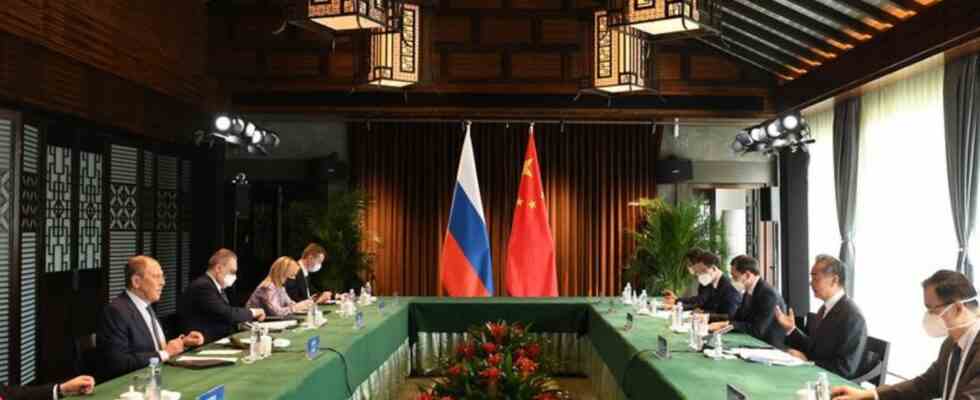diplomacy
EU-China summit: who is on the “wrong side”?
At a meeting in China, Russian Foreign Minister Sergey Lavrov and his Chinese counterpart Wang Yi agreed to expand a strategic partnership in a “difficult international situation”. Photo: Zhou Mu/XinHua/dpa
© dpa-infocom GmbH
Despite the Ukraine war, there has been no criticism of Russia from China or India. Beijing even blames Europeans and Americans. What will von der Leyen & Co. say to Xi Jinping on Friday?
The Ukraine war is also about the new world order: is there a step backwards to the old game of powers with spheres of influence, or can the rule-based order preferred by the Europeans be continued?
By backing Russian President Vladimir Putin, China and India are “on the other side,” diplomats lament. At a video summit this Friday, the leaders of the EU still want to try to influence state and party leader Xi Jinping. He is said to use his influence on Putin to end the war soon.
An impossible task for Commission President Ursula von der Leyen and Council President Charles Michel? Relations with China are already tense than ever: the Europeans criticize the persecution of the Uyghurs and Tibetans, the suppression of the opposition in Hong Kong, China’s saber-rattling against free Taiwan and its pressure on small EU members. An investment agreement has also been on hold since Chinese sanctions against EU representatives. Now the Ukraine crisis is exacerbating the tensions: Beijing portrays the Europeans, the USA and NATO as the main culprits.
Just demonstrated solidarity
During a visit to China, the foreign ministers of Russia and China, Sergei Lavrov and Wang Yi, just demonstrated their solidarity. Once the Ukraine crisis has been overcome, Lavrov sounded confident of victory, and together with other like-minded people we would move towards a “multipolar, just and democratic world order”. Wang Yi agreed: The relationship had “passed new tests” since the beginning of the year and was moving “in the right direction”.
New Delhi, where Lavrov is holding talks on Friday, also does not support the Western sanctions. Like China, it did not condemn the invasion either. The Europeans and the USA tried in vain to persuade the country to criticize the Russian war of aggression. But India has long maintained close ties with Moscow. Much of his military’s equipment comes from Russia. It is arming itself against rivals China and Pakistan and is already dependent on Moscow for spare parts. India also wants to buy Russian oil. So New Delhi is in a dilemma, since it also maintains good relations with Washington – and prefers to stay out of it.
a contradiction in itself
China, on the other hand, is much more actively pursuing a kind of “pro-Russian neutrality,” as diplomats call it — a contradiction in terms. In addition, China also provides argumentative backing. “The eastward expansion of NATO, led by the United States, is the root of the Ukraine crisis,” writes the party organ Renmin Ribao (People’s Daily). NATO is a “tool of the United States”. Like Russia, China does not speak of “war” or “invasion” but of “special military operation”.
“China distinguishes between rhetoric, which is pro-Russian, and diplomacy, which is more balanced, and real action, which lacks support for Russia,” Yun Sun of the think tank Stimson Center in Washington differentiated in the “South China Morning Post”. . The rhetoric is primarily aimed at the home audience to make China’s support for Russia – as a geostrategic partner in the rivalry against the USA – appear fair.
And how about the deeds? In fact, China’s banks were among the first to implement Western sanctions to avoid becoming a target themselves. There are also reports of Chinese oil companies holding back on projects in Russia because they don’t know if they’re seeing their money. In the end, China is pursuing its own interests alone, but wants to secure Russia’s support in order to continue to make a common front against the USA, “which is at the center of all Chinese activities,” say experts.
Also warning words from China
Only a few Chinese intellectuals dare to warn that this puts China on the “wrong side of history”. Hu Wei, vice chairman of a research center at the Beijing State Council, argued in an article in the US-China Perception Monitor – censored in China: “Being in the same boat as Putin will have an impact on China if he loses power.” He advises: “Parting with Putin and abandoning neutrality will help China’s international image and facilitate relations with the United States and the West.”
Wang Huiyao, founder of the non-governmental Beijing Center for China and Globalization, also writes in the New York Times: “It is not in China’s interest to rely solely on the anti-Western alliance with Moscow.” Like the Europeans, he advocates mediation by China, which could use its influence on Putin. However, from the point of view of diplomats, Xi Jinping is apparently not ready for this. You speak of a “missed opportunity for China to show itself as a responsible great power”.

